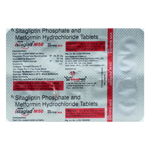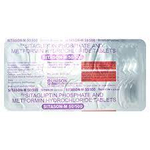sitahenz Mq
Introduction to Sitahenz Mq
Sitahenz Mq is a combination medication primarily used for the management of type 2 diabetes mellitus. It combines two active ingredients, Metformin and Sitagliptin, to help control blood sugar levels more effectively than either component alone. This medication is typically prescribed to patients who require additional glycemic control beyond what diet and exercise can provide. Sitahenz Mq comes in tablet form, making it convenient for daily use. It is important to follow your healthcare provider's instructions when taking Sitahenz Mq to ensure optimal results and minimize potential side effects.
Composition of Sitahenz Mq
The active ingredients in Sitahenz Mq are Metformin (500mg) and Sitagliptin (50mg). Metformin belongs to a class of drugs known as biguanides, which work by decreasing glucose production in the liver and improving the body's sensitivity to insulin. This helps lower blood sugar levels effectively. Sitagliptin, on the other hand, is a DPP-4 inhibitor that increases the levels of incretin hormones. These hormones help regulate insulin production and decrease the amount of sugar produced by the liver, thus further aiding in blood sugar control. Together, these components provide a comprehensive approach to managing type 2 diabetes.
Uses for Sitahenz Mq
- Helps control high blood sugar in adults with type 2 diabetes.
- Used in conjunction with diet and exercise to improve glycemic control.
- May be used as part of combination therapy for enhanced effectiveness.
- Helps reduce the risk of complications associated with diabetes, such as nerve damage and kidney problems.
Side Effects of Sitahenz Mq
- Gastrointestinal issues such as nausea, vomiting, or diarrhea.
- Headaches or dizziness.
- Upper respiratory tract infections.
- Hypoglycemia, especially when used with other diabetes medications.
- Muscle pain or weakness.
- Allergic reactions such as rash or itching.
Precautions of Sitahenz Mq
Before starting Sitahenz Mq, inform your healthcare provider about any medical history, especially concerning kidney or liver problems. Regular monitoring of blood sugar levels is essential to ensure the medication's effectiveness. Avoid excessive alcohol consumption, as it can increase the risk of lactic acidosis, a rare but serious side effect of Metformin. Pregnant or breastfeeding women should consult their doctor before using Sitahenz Mq. Additionally, inform your healthcare provider about any other medications you are taking to avoid potential drug interactions.
Conclusion
Sitahenz Mq is a valuable medication for managing type 2 diabetes, combining the benefits of Metformin and Sitagliptin to offer comprehensive blood sugar control. While effective, it is crucial to adhere to prescribed guidelines and consult with healthcare providers to tailor the treatment to individual needs. By doing so, patients can achieve better health outcomes and minimize the risk of diabetes-related complications. Always prioritize open communication with your healthcare team to ensure the safe and effective use of Sitahenz Mq.
Similar Medicines
Disclaimer : This information is not a substitute for medical advice. Consult your healthcare provider before making any changes to your treatment . Do not ignore or delay professional medical advice based on anything you have seen or read on Medwiki.
sitahenz Mq
Prescription Required
Manufacturer :
La Renon Healthcare Pvt LtdComposition :
metformin + sitagliptin















.svg)
